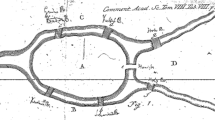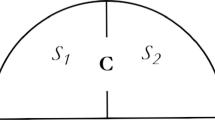Abstract
I discuss the claim what makes self-knowledge epistemologically distinctive is the fact that it is baseless or groundless. I draw a distinction between evidential and explanatory baselessness and argue that self-knowledge is only baseless in the first of these senses. Since evidential baselessness is a relatively widespread phenomenon the evidential baselessness of self-knowledge does not make it epistemologically distinctive and does not call for any special explanation. I do not deny that self-knowledge is epistemologically distinctive. My claim is only that talk of its evidential baselessness is insufficient to account for its epistemological distinctiveness.
Similar content being viewed by others
Notes
See for example, McDowell (2006, p. 92): ‘Self-knowledge has a special authority’.
There is much more on the transition from a Cartesian conception of self-knowledge to one than places the emphasis on baselessness or ‘immediacy’ in Moran (2001, pp. 1–35).
McDowell claims that ‘the special authority of self-knowledge consists in its not needing a basis’ (2006, p. 92). Wright describes phenomenal avowals—self-ascriptions like ‘I have a headache’ as groundless. That is, ‘the demand that somebody produces reasons or corroborating evidence for such a claim about themselves—“How can you tell?”—is always inappropriate. There is nothing they might reasonably be expected to say. In that sense, there is nothing upon which such claims are based’ (1998, p. 14).
Why only some self-knowledge? Because even those who claim that the special authority of self-knowledge consists in its being baseless are prepared to grant that some self-knowledge is not baseless. For example, they do not deny that sometimes one relies on evidence to determine what one believes or desires. See Wright (1998).
It might be suggested that the relevant difference between self-knowledge and non-psychological knowledge is that the former, but not the latter, is typically baseless. One problem with this is that it is false that self-knowledge is typically explanatorily baseless. Indeed, as argued below, it is doubtful that any knowledge is baseless in this sense. What seems right is that self-knowledge is typically baseless in the evidential sense. It is much less plausible that non-psychological knowledge is typically evidentially baseless so this might be a way of distinguishing self-knowledge from non-psychological knowledge in respect of baselessness. On the other hand, this manoeuvre won’t serve to distinguish self-knowledge from many specific kinds of non-psychological knowledge. For example, perceptual knowledge is non-psychological but typically evidentially baseless.
See, for example, Wright (1998, p. 22).
This is Hampshire’s (1979, pp. 282–283) view.
I take it that one proposition P is epistemically more basic than another proposition Q just if one can know or have a justification for believing that P without knowing or having a justification for believing that Q, but not vice versa.
It might be objected that while testimonial knowledge is not inferential in Moran’s sense there are other senses in which it is inferential. It might be argued, for example, that one can only acquire knowledge by testimony if one believes that one’s informant is reliable, and that this makes testimonial knowledge inferential even if the latter belief is not consciously employed as a premise in reasoning. The correct response to this objection is to argue that the relevant condition on the acquisition of testimonial knowledge is that one does not believe, and has no reason to believe, that one’s informant is unreliable. The fact that one’s knowledge depends on the absence of a certain belief is not sufficient to make one’s knowledge inferential. Indeed, even if a particular belief, say the belief that P, depends for its justification on the presence of some further belief, say the belief that Q, it still does not follow that the belief that P is inferentially justified. It depends on what kind of dependence is at issue, specifically, on whether one’s justification for believing that P comes from one’s justification for believing that Q or whether one’s justifiably believing that Q is just a background enabling condition for one to be justified in believing that P. In the latter case, one’s justification for believing that P might still qualify as non-inferential.
The perceptual knowledge that is at issue here is perceptual knowledge of non-psychological reality. The thesis that this kind of knowledge is non-inferential might be disputed on the grounds that its acquisition depends on the premise that one’s senses are not malfunctioning. My response to this worry is the same as my response in note 9 to the parallel worry about testimonial knowledge: the acquisition of perceptual knowledge depends on one not believing that one’s senses are malfunctioning. Philosophers used to think that perceptual knowledge is inferred from non-inferentially known premises about one’s own sensory experiences. As Stroud has convincingly argued (see Stroud 2000) this makes it impossible to se how perceptual knowledge is possible at all. If perceptual knowledge is possible at all then it must be non-inferential.
How can the simple answer be informative given that to see that P is to know that P? Because the answer identifies one’s specific way of knowing. The fact that ‘I see that P’ entails ‘I know that P’ is not a reason for thinking that ‘I see that P’ is not a satisfactory answer to ‘How do you known that P?’ How would an answer that leaves it open that one doesn’t know that P be any more satisfactory?
This is roughly the notion of indication that figures in Travis (2004).
Factive mental state operators (FMSOs) like ‘sees that’ denote states, ascribe propositional attitudes to subjects, and are semantically unanalysable. In addition, if Φ is an FMSO then from ‘S Φs that P’ one may infer ‘P’ and ‘S knows that P’. For the idea that ‘can feel’ or ‘could feel’ is an FMSO, see Williamson (2000, p. 36).
Thanks to Paul Snowdon for formulating this worry.
As Dretske points out, there is a difference between awareness of an armadillo, a thing, and awareness of the fact that it is an armadillo. The latter form of awareness is conceptual in a way that the former is not. If one fails to distinguish awareness of x with awareness that it is x ‘one will mistakenly infer that simply being in pain (requiring, as I am assuming, awareness of the pain) requires awareness of the fact that one is in pain and, therefore, knowledge. Not so. I am assuming that if it really hurts, you must feel pain, yes, and feeling the pain is awareness of it, but this is the kind of awareness (thing-awareness) one can have without fact-awareness of what one is aware of—that it is pain—or that one is aware of it’ (Dretske 2005, p. 60). My discussion is indebted to Dretske’s.
This is Hampshire’s account. He describes a case in which a man who doesn’t know whether he wants to go to Italy moves from his initial state of uncertainty to his knowing what he wants. According to Hampshire, the man’s process of thought is ‘properly characterized as deliberation’, where ‘deliberation is a process of thought that begins with uncertainty and is aimed at some conclusion, accepted by the subject, of the form “This is to be true of me”’ (1979, p. 289). Deliberating is a way of coming to know what one’s belief, desire or intention is to be.
I defend this view at much greater length in Cassam (2007a, pp. 155–187).
This point is emphasized in Ryle (1994).
Seeing sthat b is P is an example of what Dretske calls ‘epistemic seeing. This kind of seeing ‘does not…. involve reasoning or inferring that b is P on the basis of what one has seen to be the case or on the basis of how something looks’ (Dretske 1969, p. 159).
This is roughly Crispin Wright’s question in his (1998, p. 22).
Williamson claims that ‘if one knows that A, then there is a specific way in which one knows’ (2000, p. 34). For further discussion of this claim see Cassam (2007b). Unlike Williamson, I conceive of ways of knowing as pathways to knowledge or ways of coming to know. For Williamson, ‘ways of knowing’ are determinates of the determinable ‘knows’.
There is a defence of this conception of knowledge in Cassam (2009).
References
Audi, R. (2002). The sources of knowledge. In P. Moser (Ed.), The oxford handbook of epistemology. Oxford: Oxford University Press.
Austin, J. L. (1962). Sense and sensibilia. Oxford: Clarendon Press.
Cassam, Q. (2007a). The possibility of knowledge. Oxford: Oxford University Press.
Cassam, Q. (2007b). Ways of knowing. Proceedings of the Aristotelian Society, 107, 339–358.
Cassam, Q. (2009). What is knowledge? In Anthony O’Hear (Ed.), Epistemology (pp. 1–20). Cambridge: Cambridge University Press.
Davidson, D. (1994). Knowing one’s own mind. In Q. Cassam (Ed.), Self-knowledge. Oxford: Oxford University Press.
Dennett, D. (1981). Why you can’t make a computer that feels pain. In D. Dennett (Ed.), Brainstorms: Philosophical essays on mind and psychology. Brighton: Harvester Press.
Dretske, F. (1969). Seeing and knowing. London: Routledge & Kegan Paul.
Dretske, F. (2005). The epistemology of pain. In M. Aydede (Ed.), Pain: New essays on its nature and the methodology of its study. Cambridge, MA: The MIT Press.
Grahek, N. (2007). Feeling pain and being in pain (2nd ed.). Cambridge, MA: The MIT Press.
Hampshire, S. (1979). Some difficulties in knowing. In T. Honderich & M. Burnyeat (Eds.), Philosophy as it is. Harmondsworth: Penguin.
Kelly, T. (2006). Evidence. In E. N. Zalta (Ed.), The stanford encyclopedia, from http://plato.stanford.edu/entries/evidence/. Accessed Apr 2007.
McDowell, J. (1998a). On “the reality of the past”. In J. McDowell (Ed.), Meaning, knowledge, and reality. Cambridge, MA: Harvard University Press.
McDowell, J. (1998b). Response to Crispin Wright. In C. Wright, B. Smith, & C. Macdonald (Eds.), Knowing our own minds. Oxford: Clarendon Press.
McDowell, J. (2006). Response to Cynthia Macdonald. In C. Macdonald & G. Macdonald (Eds.), McDowell and his critics. Oxford: Blackwell Publishing.
Mill, J. S. (1891). A system of logic. London: Longman’s, Green and Co.
Moran, R. (2001). Authority and estrangement: An essay on self-knowledge. Princeton & Oxford: Princeton University Press.
Nichols, S., & Stich, S. (2003). Mindreading: An integrated account of pretence, self-awareness, and understanding other minds. Oxford: Oxford University Press.
Ryle, G. (1994). Self-knowledge. In Q. Cassam (Ed.), Self-knowledge. Oxford: Oxford University Press.
Shoemaker, S. (1994). Introspection and the self. In Q. Cassam (Ed.), Self-knowledge. Oxford: Oxford University Press.
Stroud, B. (2000). Understanding human knowledge in general. In B. Stroud (Ed.), Understanding human knowledge. Oxford: Oxford University Press.
Travis, C. (2004). The silence of the senses. Mind, 113, 57–94.
Williamson, T. (2000). Knowledge and its limits. Oxford: Oxford University Press.
Wittgenstein, L. (1978). Philosophical investigations. Oxford: Basil Blackwell.
Wright, C. (1998). Self-knowledge: The Wittgensteinian legacy. In C. Wright, B. Smith, & C. Macdonald (Eds.), Knowing our own minds. Oxford: Clarendon Press.
Acknowledgments
Many thanks to participants in the Duisburg-Essen conference on first person authority for valuable comments on an earlier version of this paper. Thanks also to Ciara Fairley, Paul Snowdon and Tim Williamson for helpful comments and discussions.
Author information
Authors and Affiliations
Corresponding author
Rights and permissions
About this article
Cite this article
Cassam, Q. The Basis of Self-Knowledge. Erkenn 71, 3–18 (2009). https://doi.org/10.1007/s10670-009-9164-z
Received:
Accepted:
Published:
Issue Date:
DOI: https://doi.org/10.1007/s10670-009-9164-z




